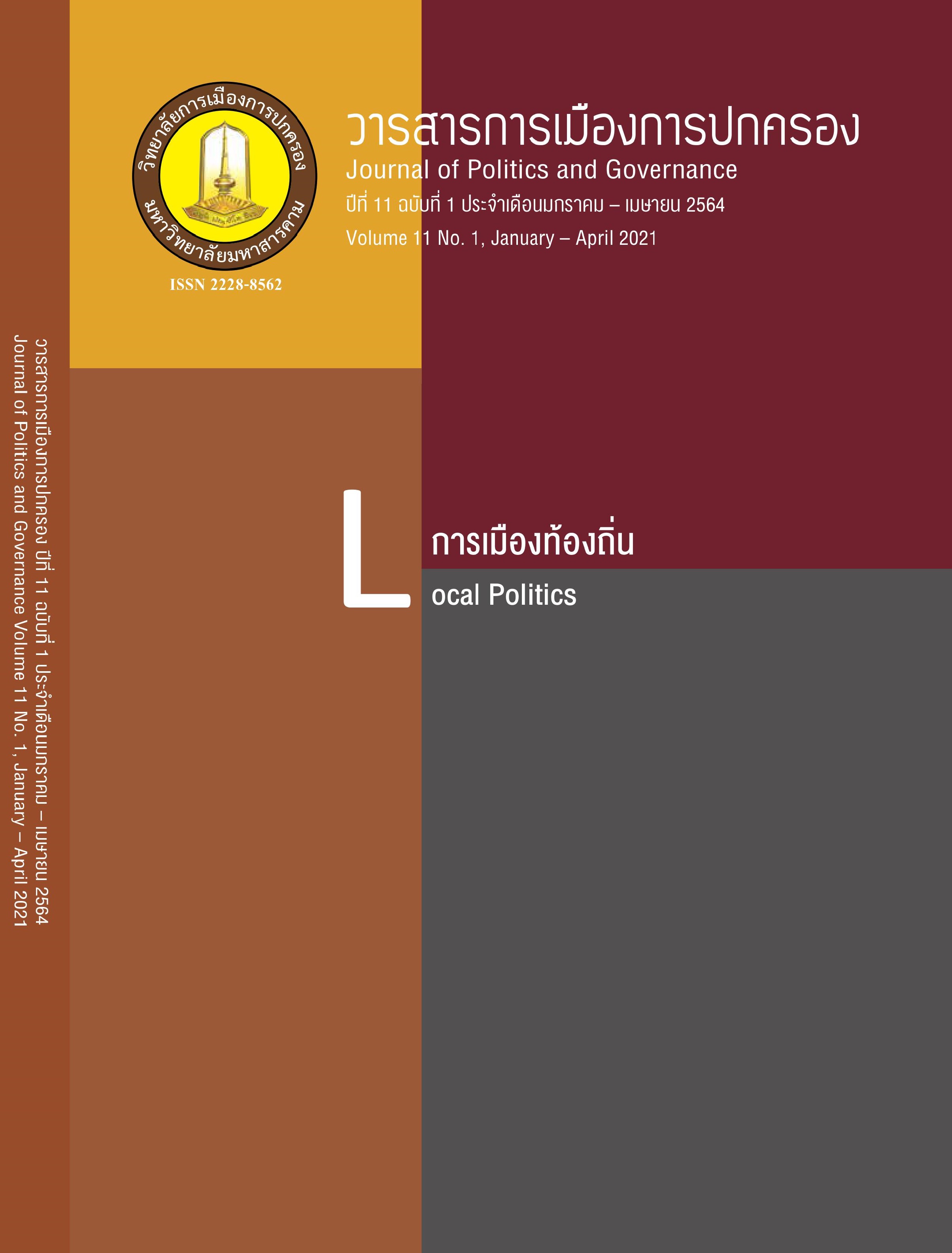Promotion of public participation in waste separation in Bang Phlat District of Bangkok
Main Article Content
Abstract
The purposes of this research were to: (1) study the level of public participation in waste separation activities in Bang Phlat District of Bangkok; (2) study the level of satisfaction of people in Bang Phlat District in terms of efficiency of the operation for waste separation by Bang Phlat District Office; and (3) study the guidelines for promoting public participation in waste separation activities in Bang Phlat District. The sample of this study consisted of 400 community members in Bang Phlat, Bangkok. The research instrument used for data collection was a questionnaire. The statistical procedures employed included frequency, percentage, mean, standard deviation, and Pearson correlation coefficient. The research findings were as follows: 1) Overall public participation in waste separation activities in Bang Phlat was at a low level. There were two facets of waste separation in Bang Phlat that were at a low level of public participation, namely: cooperation and performance appraisal in waste separation. Whilst, public participation in problem analysis and in planning for waste separation were at the lowest levels; 2) the overall efficiency of waste separation by Bang Phlat District Office was at a low level. Considering each aspect of efficiency of waste separation by Bang Phlat District Office individually, there was one facet that was at a moderate level (i.e. waste transport). In contrast, another two facets of waste separation were at a low level: the campaign encouraging public to participate in waste separation and the budget allocation for waste separation; and 3) the public participation in waste separation activities by people in Bang Phlat had a significant correlation with the efficiency of waste separation by Bang Phlat District Office with a statistical significance at 0.01. From the results of this research, the following suggestions can be made: (1) for the consideration of policies; focusing on promoting participation and motivating waste sorting, including the separation of waste by the Bang Phlat District Office should be an example for the people as well (2) for the consideration of proceedings; (a) Organize workshops that are can facilitate the sharing of opinions among stakeholders, such as public and private communities, (b) Stakeholders work together to plan for the Bang Phlat District to be a good model for public participation in waste separation, (c) Stakeholders together plan to implement checks and evaluations of waste separation efficiency, (d) Promote access to information on waste separation for stakeholders by using various communication methods, (e) Create incentives for sorting waste, such as revenue generation from waste sorting, (f) Supporting budgets and equipment for waste sorting adequately by promoting good management.
Article Details
References
จิดาภา นิสสัยสุข. (2554). การมีส่วนร่วมของประชาชนในการเข้าร่วมประชาคมในเขตองค์การบริหารส่วนตำบลคลองตำหรุ อำเภอเมือง จังหวัดชลบุรี. (ปัญหาพิเศษ หลักสูตรปริญญา รัฐประศาสนศาสตรมหาบัณฑิต). สาขาวิชาการบริหารทั่วไป วิทยาลัยการบริหารรัฐกิจ. มหาวิทยาลัยบูรพา.
แผนบริหารจัดการขยะมูลฝอยของกรุงเทพมหานคร พ.ศ. 2558 – 2562. สืบค้นจาก http://203.155.220.174/download/article/article_20190530171702.pdf
ยุพาพร รูปงาม. (2545). การมีส่วนร่วมของข้าราชการสำนักงบประมาณ ในการปฏิรูป ระบบราชการ. (ภาคนิพนธ์ศิลปศาสตรมหาบัณฑิต). สถาบันบัณฑิตพัฒนบริหารศาสตร์.
โยธิน แสวงดี. (2559). การวิจัยในเชิงปริมาณ (Quantitative Research). สืบค้นจากhttps://www.spu.ac.th/research
ปาริชาติ วลัยเสถียรและคณะ. (2541). กระบวนการและเทคนิคการทำงานของนักพัฒนา. กรุงเทพฯ: สำนักงานกองทุนสนับสนุนการวิจัย.
มุกดา สุขสวัสดิ์. (2539). ใช้แล้วใช้อีกให้ คุ้มค่า. กสิกร. มกราคม – กุมภาพันธ์.
ลือชัย วงษทอง. (2555). ประสิทธิผลของการนำนโยบายแรงงานต่างด้าวสัญชาติพม่าไปปฏิบัติ ในพื้นที่ อำเภอแม่สอด จังหวัดตาก. (ดุษฎีนิพนธ์ หลักสูตรปรัชญาดุษฎีบัณฑิต). สาขาวิชารัฐประศาสนศาสตร วิทยาลัยการบริหารรัฐกิจ. มหาวิทยาลัยบูรพา.
สำนักงานเขตบางพลัด. แผนปฏิบัติราชการประจำปี พ.ศ. 2561. สืบค้นจาก https://www.bangkok. go.th/bangphlat/sitemap
สำนักสิ่งแวดล้อม. สถิติปริมาณมูลฝอย. สืบค้นจาก https://www.bangkok.go.th/ environmentbma
Meter, V. D. S., & Horn, V. C. E. (1975). The policy implementation process: a conceptual framework. Administration and Society, 6(4), 445-488.
William Erwin. (1976). Participation Management : Concept Theory and Implementation. Atlanta G.: Georgia State University.
Yamane, Taro. (1973). Statistics: An Introductory Analysis. Third editio. Newyork : Harper and Row Publication


